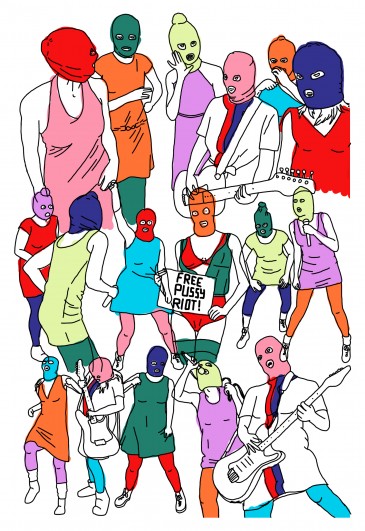When Madonna strips her shirt off mid-concert to reveal “Free Pussy Riot” written on her back, you get a sense of just how significant the Russian activist group’s sacrifices have become.

In February of 2012, five young women donning brightly coloured balaclavas staged an impromptu air-guitar punk-rock performance at a Moscow Orthodox cathedral, singing “Mother of God, Rid Us of Putin” and calling for a separation of the church from the state. They had barely started their performance before they were escorted out, an incident which would lead to the arrest of three of the performers the following month.
Nevermind the courageous marketing antics that turn even Madonna into a passionate endorser, in a country where conceptual art is banned and the government has unofficially granted the church a militant authority, this is not a stunt—it is borderline suicide. It is also at the core of Pussy Riot: A Punk Prayer, a documentary by British filmmaker Mike Lerner and Russian co-director Maxim Pozdorovkin.
Pussy Riot is a loose collective of Russian feminist punk rockers, political provocateurs, and artists who have been active since 2008. Three of the group’s members, Maria Aliokhina, Nadezhda Tolokonnikova, and Yekaterina Samutsevich, shot to the international spotlight after Putin’s government staged a very public and controversial trial, sending them to a labour prison camp in Siberia.
From the start of the film, Lerner and Pozdorovkin portray the three women as empathetic protagonists through interviews with their parents, researching their academic background, and shedding light on their activist beginnings. For example, seven years ago one of the women participated in a protest at the Timiryazev State Biology Museum in Moscow where she engaged in public sex with her husband while pregnant. The recounts of past activism are both shocking and humbling, making clear that these girls are no “overnight successes” and have been staging incendiary performances for years before hitting an international nerve.
For most of the documentary’s second act, we share in the claustrophobia of the punk activists as they sit helplessly inside a glass booth, witnessing the trial develop, with their defence attorneys impotently observing and making powerful—albeit clearly hopeless—condemnations of the modern Russian legal system. The girls’ eloquent, truthful defence statements and the masses of supporters chanting anti-government slogans outside the courthouse seem like desperate exercises in futility against a system that suppresses human rights and censors communication.
In fact, the path to empowerment is written on the wall—the social media wall, that is. The international debate sparked by Pussy Riot puts one thing in clear perspective: social media has provided oppressed people around the world with an unprecedented ability to bring accountability to the powers that be.
Since the film’s release last year, Russia has remained prominent in the controversy spotlight (Sochi Olympics, anyone?) but A Punk Prayer does an excellent job of looking closer at some of the injustices being committed against free speech. If you ever have the opportunity, I strongly recommend assembling a few of your friends and seeing the documentary—just don’t forget to bring your purple balaclava.

